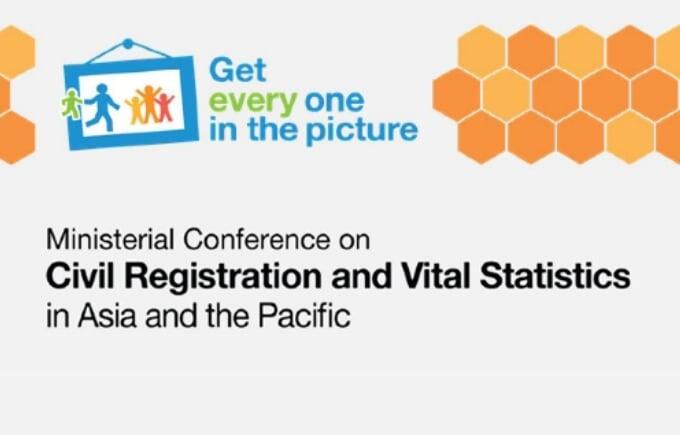BANGKOK, Thailand – Asia-Pacific countries embarked on an ambitious agenda today to accelerate and focus efforts to improve civil registration and vital statistics (CRVS) systems at a Ministerial Conference convened by the United Nations Economic and Social Commission for Asia and the Pacific (ESCAP).
The Ministerial Conference on Civil Registration and Vital Statistics (CRVS) in Asia and the Pacific adopted a Ministerial Declaration to ‘Get every one in the picture’ and proclaimed the ‘Asian and Pacific CRVS Decade’ for 2015-2024. To implement the declaration, governments endorsed a regional action framework of goals and nationally-set time-bound targets for civil registration coverage, issuance of legal documentation and production of vital statistics by 2024.
“The declaration we have forged today affirms our shared vision that, by 2024, we will: achieve universal registration of all key life events; provide all people with legal proof of identity; and use these registration records to produce and openly share accurate, complete and timely vital statistics,” said Dr. Shamshad Akhtar, United Nations Under-Secretary-General and ESCAP Executive Secretary, speaking at the closing ceremony.
“Our job now, is to work together in partnership and solidarity. To realize the dreams of millions of people in our region who want a legal identity and seek a better future.”
Currently 36 countries in the Asia-Pacific region do not possess universal and responsive civil registration and vital statistics systems that meet relevant international standards. 135 million children under the age of 5 have not had their birth registered. Without birth registration, a child's access to education, health care and social security may be hampered. Without proper recording of causes of death, governments are unable to respond to the health service needs of the public. Today, governments took a giant leap to address these issues forging high-level political commitment for the improvement of CRVS systems in the region.
The Ministerial declaration outlines the commitment of governments to achieve a shared vision that, by 2024, all people in Asia and the Pacific will benefit from universal and responsive CRVS systems that facilitate the realization of their rights and support good governance, health and development.
“The right to be recognized as a person before the law is an inalienable human right. Civil registration captures the events that mark the cycle of life and is an indispensable source of information to formulate effective policies and promote good governance,” said Ms. Nobuko Horibe, Regional Director for Asia and the Pacific, UNFPA in her closing remarks on behalf of co-organisers.
“As development partners, we stand committed to support the national efforts needed to ensure that universal and responsive civil registration and vital statistics systems are in place in all countries in the region by 2024."
The regional action framework aims to accelerate and focus the combined efforts of governments and development partners to improve CRVS in Asia and the Pacific and contains key principles, regional goals and national targets, action areas and implementation steps. This also includes a governance mechanism for its implementation and the long-term architecture for civil registration and vital statistics in Asia and the Pacific.
Youth voices featured prominently at the conference, with youth participants presenting a Youth Call to Action to complement the Ministerial Declaration and the Regional Action Framework which will inform youth work on CRVS in the future.
“It is the first time that youth voices and opinions about CRVS have been brought to a Ministerial Conference,” said Nigel Chapman, Plan International CEO. “We want them to be heard and we want them to be part of producing changes on CRVS in Asia and the Pacific to ensure everyone gets in the picture by 2024.”
The Conference was co-organized by ESCAP, UNICEF, UNDP, UNHCR, UNFPA, WHO, ADB and Plan International, in collaboration with the Partnership for Maternal, Newborn and Child Health, the World Bank Group, the Asia Pacific Observatory on Health Systems and Policies, the Partnership for Statistics Development in the 21st Century (PARIS21), the Secretariat of the Pacific Community and World Vision.


